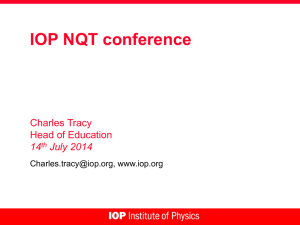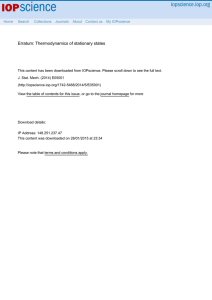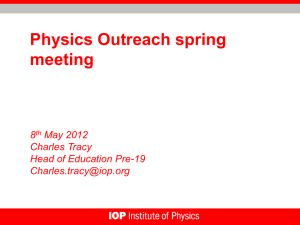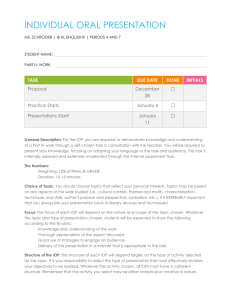5. How to apply - Institute of Physics
advertisement
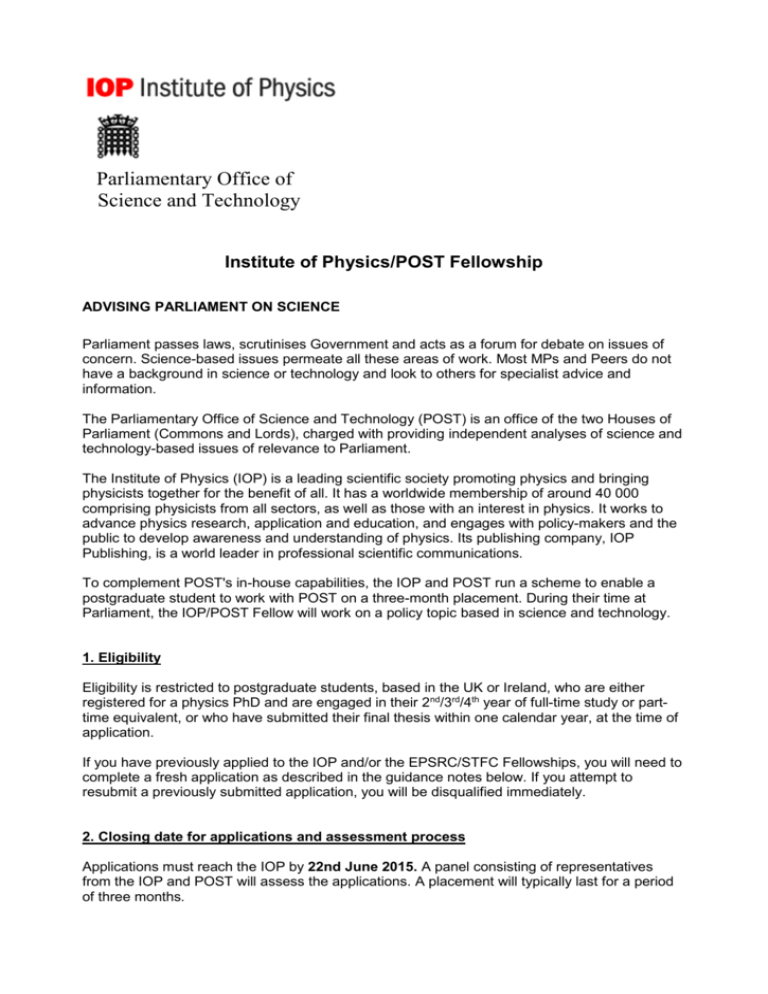
Parliamentary Office of Science and Technology Institute of Physics/POST Fellowship ADVISING PARLIAMENT ON SCIENCE Parliament passes laws, scrutinises Government and acts as a forum for debate on issues of concern. Science-based issues permeate all these areas of work. Most MPs and Peers do not have a background in science or technology and look to others for specialist advice and information. The Parliamentary Office of Science and Technology (POST) is an office of the two Houses of Parliament (Commons and Lords), charged with providing independent analyses of science and technology-based issues of relevance to Parliament. The Institute of Physics (IOP) is a leading scientific society promoting physics and bringing physicists together for the benefit of all. It has a worldwide membership of around 40 000 comprising physicists from all sectors, as well as those with an interest in physics. It works to advance physics research, application and education, and engages with policy-makers and the public to develop awareness and understanding of physics. Its publishing company, IOP Publishing, is a world leader in professional scientific communications. To complement POST's in-house capabilities, the IOP and POST run a scheme to enable a postgraduate student to work with POST on a three-month placement. During their time at Parliament, the IOP/POST Fellow will work on a policy topic based in science and technology. 1. Eligibility Eligibility is restricted to postgraduate students, based in the UK or Ireland, who are either registered for a physics PhD and are engaged in their 2nd/3rd/4th year of full-time study or parttime equivalent, or who have submitted their final thesis within one calendar year, at the time of application. If you have previously applied to the IOP and/or the EPSRC/STFC Fellowships, you will need to complete a fresh application as described in the guidance notes below. If you attempt to resubmit a previously submitted application, you will be disqualified immediately. 2. Closing date for applications and assessment process Applications must reach the IOP by 22nd June 2015. A panel consisting of representatives from the IOP and POST will assess the applications. A placement will typically last for a period of three months. Please note that late applications will not be accepted. Interviews are likely to be held in the week commencing 6th July 2015. 3. Start date of placement The fellowship start date is likely to be between October 2015 and January 2016. The start date is to be agreed between the applicant, the Director of POST, the applicant's supervisor and university (if relevant), and the IOP. 4. Details of placement 4.1 Nature of the work: POST regularly publishes short briefing papers (POSTnotes) and longer reports giving Parliamentarians a broad overview of the background to an issue and an analysis of the policy implications (see www.parliament.uk/post for examples of POST publications). During their time in Parliament, an IOP/POST Fellow should expect to produce a POSTnote, contribute to a longer report or assist a select committee of either House in a current inquiry. They may also undertake a placement with the library of either the House of Commons or House of Lords, responding to inquiries from MPs and Peers on a range of scientific and technological issues If the fellow works on a POSTnote, the topic of the Fellowship will be determined in liaison between the Fellow, POST and the IOP, depending on the research interests of the Fellow and the relevance and timeliness of the topic in Parliament. The overall work programme of POST is determined by its parliamentary Board. Because of the nature of the parliamentary timetable, applicants should be aware that they may be required to work on something other than their proposed topics. POSTnote production will involve: identifying and liaising with a wide range of interested parties including industry, academia, regulatory bodies, non-governmental organisations and government; drafting concise briefing materials; and responding to comments from internal and external peer review. There may also be opportunities for the Fellow to organise seminars to inform or disseminate their work. In addition, the Fellow will be expected to write a number of blog posts for the IOP website and possibly be invited to make a formal presentation at a relevant event providing an account of their experience working for Parliament. POST is a strictly non-partisan organisation. Fellows will be expected not to be involved in any party political activity during their time with the Office. In all cases, Fellows will be encouraged to interact closely with people and activities in the two Houses of Parliament, including select committees, MPs and Peers, their support services, 'All-Party Group' meetings and the very wide range of other activities at the Palace of Westminster. Also, Fellows will be encouraged to interact with interested parties outside Parliament. Access to conferences, workshops and seminars is likely to be arranged. 4.2 Funding arrangements The successful applicant will receive funding equivalent to their PhD award plus any additional accommodation or travel costs incurred during the period of the Fellowship outside of their usual working requirements (e.g. for relevant conferences), which will be paid by the IOP either directly to the applicant or reimbursed. The applicant will need to arrange for his/her PhD to be extended by three months with their supervisor and the relevant funding body. 4.3 Working arrangements The successful applicant should ideally spend five days a week working in POST's offices in London, however, some flexibility can be arranged depending on personal circumstances. In all cases, it would be preferable for the individual to reside within reasonable commuting distance for the duration of the placement. Computing, e-mail and other facilities necessary for the project will be supplied by POST’s offices. 5. How to apply Applicants should submit: a completed application form, which has been approved by their Head of Department or principal supervisor; a concise, appropriately formatted cover letter outlining reasons for wishing to work for POST; and a two-page POSTnote on one of the topics below. You should choose a topic which is unrelated to your PhD topic of study. The note must be of relevance to parliamentarians and highlight issues of concern relating to the science, and policy implications of the topic. The POSTnote should be no longer than two sides of A4 and can include figures. The possible topics for the two-page POSTnote are: - space transportation - access to sanitation in developing countries - cyberwarfare - net neutrality - artificial intelligence The criteria for assessment are: content (accuracy and breadth of research) clarity writing style (pitched at a suitable level for parliamentarians) policy relevance balance and objectivity structure awareness of other relevant work in the area. Please send the completed application form and proposal to: Daniel Lee, Policy Officer, IOP at daniel.lee@iop.org Closing date for applications is 22nd June 2015. Before preparing your note you might find it useful to examine the 'POST style' of writing and formatting, and the type of policy issues that are raised and discussed. POST's publications can be viewed on the web at: www.parliament.uk/post 6. Queries Any queries relating to the application process should be directed to Daniel Lee at daniel.lee@iop.org. POST's Physical Sciences and IT Adviser, Dr Chandrika Nath, is available on e-mail nathc@parliament.uk to discuss any general aspects of the scheme and of parliamentary activity. Please note neither the IOP nor POST can advise on the strength or weaknesses of individual proposals. If you need any additional support in order to participate in an interview (or to take up a fellowship at POST), please outline your requirements here. If you would like more information, please contact Dr Chandrika Nath as indicated above.
